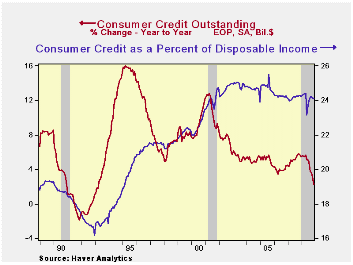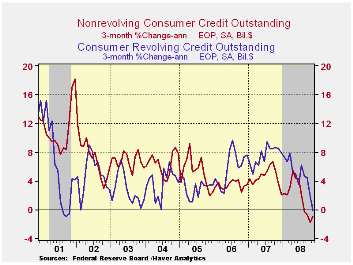 Global| Jan 08 2009
Global| Jan 08 2009Credit Cards Pocketed; The Frugal U.S. Consumer
by:Tom Moeller
|in:Economy in Brief
Summary
U.S. consumer credit usage dropped during November for the third month in the last four. The Federal Reserve reported that consumer credit outstanding fell $8.0 billion m/m after a $2.8B October decline that was slightly shallower [...]

U.S. consumer credit usage dropped during November for the third month in the last four. The Federal Reserve reported that consumer credit outstanding fell $8.0 billion m/m after a $2.8B October decline that was slightly shallower than reported initially. On a percentage basis, credit outstanding over the last three months fell at a 0.6% annual rate which was the largest decline since 1992.
Annualized, credit growth averaged 8% during the fifteen years ended 2007. Over an even longer period that increase does not loom particularly large. However, against an average 5% growth in disposable income during those years, it precipitated a rise in the ratio to disposable income to 24% from a longer term norm of 17%. The credit cards are now being put away, certainly with the weakness in the labor market.
Non-revolving credit, which accounts for nearly two-thirds of total consumer credit, dropped sharply for the third month in the last four. The whopping $5.2B m/m drop was near the largest on record and it reduced annualized growth during the last three months to -0.9%, the weakest since 1992. That followed a 4.4% rise last year.
Revolving credit outstanding fell $2.8B during November. This dropped the three-month growth in credit card usage to -0.1%. That was down from the 7.4% growth last year and it was the weakest since the recession year of 2001.
These figures are the major input to the Fed's quarterly Flow of Funds accounts for the household sector. For 4Q08 the data will be released later this month.
These data are available in Haver's USECON database.
The Budget and Economic Outlook: Fiscal Years 2009 to 2019 from the Congressional Budget Office can be found here.
| Consumer Credit (m/m Chg, SAAR) | November | October | Y/Y | 2007 | 2006 | 2005 |
|---|---|---|---|---|---|---|
| Total | $-8.0B | $-2.8B | 2.3% | 5.5% | 4.5% | 4.3% |
| Revolving | $-2.8B | $0.0B | 4.0% | 7.4% | 6.1% | 3.1% |
| Non-revolving | $-5.2B | $-2.8B | 1.2% | 4.4% | 3.6% | 4.9% |
Tom Moeller
AuthorMore in Author Profile »Prior to joining Haver Analytics in 2000, Mr. Moeller worked as the Economist at Chancellor Capital Management from 1985 to 1999. There, he developed comprehensive economic forecasts and interpreted economic data for equity and fixed income portfolio managers. Also at Chancellor, Mr. Moeller worked as an equity analyst and was responsible for researching and rating companies in the economically sensitive automobile and housing industries for investment in Chancellor’s equity portfolio. Prior to joining Chancellor, Mr. Moeller was an Economist at Citibank from 1979 to 1984. He also analyzed pricing behavior in the metals industry for the Council on Wage and Price Stability in Washington, D.C. In 1999, Mr. Moeller received the award for most accurate forecast from the Forecasters' Club of New York. From 1990 to 1992 he was President of the New York Association for Business Economists. Mr. Moeller earned an M.B.A. in Finance from Fordham University, where he graduated in 1987. He holds a Bachelor of Arts in Economics from George Washington University.
More Economy in Brief
 Global| Feb 05 2026
Global| Feb 05 2026Charts of the Week: Balanced Policy, Resilient Data and AI Narratives
by:Andrew Cates






